 science DigitalisationOlympic questions: which tech makes you move better?In elite sport, progress is measured in tiny improvements. But for athletes who are not (yet) competing at Olympic level, sports technology can enable major leaps forward. At the University of Twente, Associate Professor Dennis Reidsma works with students and colleagues to explore how interactive systems are transforming sport and motor learning.
science DigitalisationOlympic questions: which tech makes you move better?In elite sport, progress is measured in tiny improvements. But for athletes who are not (yet) competing at Olympic level, sports technology can enable major leaps forward. At the University of Twente, Associate Professor Dennis Reidsma works with students and colleagues to explore how interactive systems are transforming sport and motor learning. science ClimateOlympic questions: What makes an ice skating suit faster?Ice skating at speeds exceeding 50 kilometres per hour. How do olympians achieve that top speed on the ice? The push-off is crucial, of course, but did you know that at Olympic speeds, approximately 80 per cent of the opposing force is air resistance? In this episode of Kees Study, I dive into the wind tunnel to discover how aerodynamics can make the difference between silver and gold.
science ClimateOlympic questions: What makes an ice skating suit faster?Ice skating at speeds exceeding 50 kilometres per hour. How do olympians achieve that top speed on the ice? The push-off is crucial, of course, but did you know that at Olympic speeds, approximately 80 per cent of the opposing force is air resistance? In this episode of Kees Study, I dive into the wind tunnel to discover how aerodynamics can make the difference between silver and gold. science TechnologyOlympic questions: Why can you skate on ice?Olympic speed skaters glide effortlessly over the ice. Figure skaters spin as if friction barely exists. Ice skating looks effortless, but for physicists, that is deeply strange. In fact, ice skating should not work at all.
science TechnologyOlympic questions: Why can you skate on ice?Olympic speed skaters glide effortlessly over the ice. Figure skaters spin as if friction barely exists. Ice skating looks effortless, but for physicists, that is deeply strange. In fact, ice skating should not work at all. science HealthOlympic questions: how safe is the road to gold?No whining, just perform. For many athletes, that's a lesson they learn early on at their sports club. Standards like that travel with them, from youth teams to the Olympic podium. But they also have a downside: an increased risk of physical, psychological and sexual misconduct. The Winter Games show a glorious result. But how safe is the road to get there?
science HealthOlympic questions: how safe is the road to gold?No whining, just perform. For many athletes, that's a lesson they learn early on at their sports club. Standards like that travel with them, from youth teams to the Olympic podium. But they also have a downside: an increased risk of physical, psychological and sexual misconduct. The Winter Games show a glorious result. But how safe is the road to get there? science ClimateHow UT’s first wine harvest prevents microplastics in agricultureDo you know what polymer chemistry and wine have in common? The Sustainable Polymer Chemistry Group at the University of Twente harvested grapes from our own small vineyard on campus, which yielded 25 litres of white wine. While the wine is purely for the seasonal festivities, the grape leaves are being used to study biodegradable nano- and microcarriers that leave no microplastics behind.
science ClimateHow UT’s first wine harvest prevents microplastics in agricultureDo you know what polymer chemistry and wine have in common? The Sustainable Polymer Chemistry Group at the University of Twente harvested grapes from our own small vineyard on campus, which yielded 25 litres of white wine. While the wine is purely for the seasonal festivities, the grape leaves are being used to study biodegradable nano- and microcarriers that leave no microplastics behind.
 science DigitalisationSnapchat's Secret Sauce: how your phone knows you’ve winkedYou raise an eyebrow and a cartoon crown pops onto your head. You hold up to fingers, and suddenly: flames! Snapchat filters might feel like magic, but they’re not. Behind every funny mask and smooth skin effect is a computer that has learned to ‘see’. At the University of Twente, student learn to do this themselves. Creative engineering!
science DigitalisationSnapchat's Secret Sauce: how your phone knows you’ve winkedYou raise an eyebrow and a cartoon crown pops onto your head. You hold up to fingers, and suddenly: flames! Snapchat filters might feel like magic, but they’re not. Behind every funny mask and smooth skin effect is a computer that has learned to ‘see’. At the University of Twente, student learn to do this themselves. Creative engineering! science RoboticsKees Study: How difficult is it to take a biopsy in an MRI scanner?Taking a biopsy while a patient is lying in an MRI scanner is extremely complicated. It requires extreme precision. Most robots cannot operate near an MRI scanner. In this new episode of Kees Study, I discover how medical robotics makes this possible, with a robot specially designed for MRI-guided breast biopsy.
science RoboticsKees Study: How difficult is it to take a biopsy in an MRI scanner?Taking a biopsy while a patient is lying in an MRI scanner is extremely complicated. It requires extreme precision. Most robots cannot operate near an MRI scanner. In this new episode of Kees Study, I discover how medical robotics makes this possible, with a robot specially designed for MRI-guided breast biopsy. science HealthCan recovery after cardiac arrest be predicted?After a cardiac arrest, patients and their families enter a period of deep uncertainty. Who will wake up? And what will life look like afterwards? UT PhD researcher Astrid Glimmerveen (TechMed Centre) studied brain signals that could help doctors better predict recovery and organise aftercare more effectively.
science HealthCan recovery after cardiac arrest be predicted?After a cardiac arrest, patients and their families enter a period of deep uncertainty. Who will wake up? And what will life look like afterwards? UT PhD researcher Astrid Glimmerveen (TechMed Centre) studied brain signals that could help doctors better predict recovery and organise aftercare more effectively. science HealthCarbide shooting or fireworks: Which packs the safest punch?New Year’s Eve, loud bangs from milk churns in the meadow, a mug of hot chocolate in hand: a true Twente tradition. In several regions, carbide shooting is firmly rooted in the turn-of-the-year celebrations, complete with clear safety regulations to keep the custom both enjoyable and secure. Will carbide shooting gain popularity now that private fireworks will be banned from 2026? And is it actually safer?
science HealthCarbide shooting or fireworks: Which packs the safest punch?New Year’s Eve, loud bangs from milk churns in the meadow, a mug of hot chocolate in hand: a true Twente tradition. In several regions, carbide shooting is firmly rooted in the turn-of-the-year celebrations, complete with clear safety regulations to keep the custom both enjoyable and secure. Will carbide shooting gain popularity now that private fireworks will be banned from 2026? And is it actually safer? science Chip TechnologyWhy light in churches looks magical, and its connection with chipsWalk into a church on a clear day, and you can feel the light change. Reds seem to glow from within, yellows land softly on stone, blues deepen the air. It looks like pure artistry, but a lot of that effect comes from something the makers never saw directly: nanoscale structure inside the glass. Himadri Sahoo, a postdoctoral researcher in the Adaptive Quantum Optics group, takes us from coloured church windows to modern photonic chips, showing how old ideas about light are still used in cutting-edge research.
science Chip TechnologyWhy light in churches looks magical, and its connection with chipsWalk into a church on a clear day, and you can feel the light change. Reds seem to glow from within, yellows land softly on stone, blues deepen the air. It looks like pure artistry, but a lot of that effect comes from something the makers never saw directly: nanoscale structure inside the glass. Himadri Sahoo, a postdoctoral researcher in the Adaptive Quantum Optics group, takes us from coloured church windows to modern photonic chips, showing how old ideas about light are still used in cutting-edge research. science HealthFrom the UT-kitchen: Recipe for mini-heartsEvery recipe website seems convinced that you simply cannot make banana bread without first reliving someone’s traumatic childhood memory. But I’m not here to get sentimental about a fake sob story. I’m using a recipe format for a very simple reason: at the University of Twente, we “bake” mini-hearts in the lab. They squish, they jiggle, they contract. And the steps to make them read surprisingly like a cookbook minus the calories, plus some stem cells and all the fun.
science HealthFrom the UT-kitchen: Recipe for mini-heartsEvery recipe website seems convinced that you simply cannot make banana bread without first reliving someone’s traumatic childhood memory. But I’m not here to get sentimental about a fake sob story. I’m using a recipe format for a very simple reason: at the University of Twente, we “bake” mini-hearts in the lab. They squish, they jiggle, they contract. And the steps to make them read surprisingly like a cookbook minus the calories, plus some stem cells and all the fun. science Circular EconomySinteresting: How can Sinterklaas make his steamboat more sustainable?Every year, Sinterklaas travels from Spain to the Netherlands by his trusted steamboat. But such an old boat is, of course, anything but clean. Because Sinterklaas wants to do his bit for a better environment, this year he wants to investigate how he can make his steamboat more sustainable.
science Circular EconomySinteresting: How can Sinterklaas make his steamboat more sustainable?Every year, Sinterklaas travels from Spain to the Netherlands by his trusted steamboat. But such an old boat is, of course, anything but clean. Because Sinterklaas wants to do his bit for a better environment, this year he wants to investigate how he can make his steamboat more sustainable. science DigitalisationWhy does ChatGPT write terrible Secret Santa poems?Imagine: it’s Secret Santa night. You nervously tap on your phone and ask ChatGPT to whip up a quick poem. The result is… um, well… not exactly gift-worthy. Why are AI models such as ChatGPT often unable to rhyme properly? Thijs van Ede, AI researcher at the University of Twente, knows why and explains AI and rhyming.
science DigitalisationWhy does ChatGPT write terrible Secret Santa poems?Imagine: it’s Secret Santa night. You nervously tap on your phone and ask ChatGPT to whip up a quick poem. The result is… um, well… not exactly gift-worthy. Why are AI models such as ChatGPT often unable to rhyme properly? Thijs van Ede, AI researcher at the University of Twente, knows why and explains AI and rhyming. science Chip TechnologyHow secure is our future in an era of global tensions?As a small country, the Netherlands has historically always opened itself up to the rest of the world. In that respect, we are living in turbulent times. Trade wars between the United States, the European Union and China are creating uncertainty in both financial and goods markets. The war in Ukraine has exposed the fragility of our global supply chains. And the conflict in Gaza has revealed deep divisions within Europe. What lies ahead for the Netherlands in the coming years? We discuss the current state of affairs and the geopolitical future with Melle Scholten, political economist affiliated with the Public Administration programme at the University of Twente.
science Chip TechnologyHow secure is our future in an era of global tensions?As a small country, the Netherlands has historically always opened itself up to the rest of the world. In that respect, we are living in turbulent times. Trade wars between the United States, the European Union and China are creating uncertainty in both financial and goods markets. The war in Ukraine has exposed the fragility of our global supply chains. And the conflict in Gaza has revealed deep divisions within Europe. What lies ahead for the Netherlands in the coming years? We discuss the current state of affairs and the geopolitical future with Melle Scholten, political economist affiliated with the Public Administration programme at the University of Twente. science TechnologyHow do smart cars react so quickly?Imagine you are sitting in a self-driving car. Suddenly, someone runs across the street. In a fraction of a second, the car decides to brake. How does it do that so quickly? And could it do so even faster or with less energy, especially now that self-driving cars and autonomous vehicles rely heavily on cameras, smart sensors and AI systems?
science TechnologyHow do smart cars react so quickly?Imagine you are sitting in a self-driving car. Suddenly, someone runs across the street. In a fraction of a second, the car decides to brake. How does it do that so quickly? And could it do so even faster or with less energy, especially now that self-driving cars and autonomous vehicles rely heavily on cameras, smart sensors and AI systems? science DigitalisationHow can we make AI more humane and inclusive?When we talk about artificial intelligence, we often think of data, algorithms and efficiency. But what if we approached technology not just as something functional, but as something deeply human? Something that doesn’t replace us, but connects us?
science DigitalisationHow can we make AI more humane and inclusive?When we talk about artificial intelligence, we often think of data, algorithms and efficiency. But what if we approached technology not just as something functional, but as something deeply human? Something that doesn’t replace us, but connects us? science TechnologyElection questions: Can you vote tactically?It’s a thought that crosses many people’s minds as elections draw closer. The idea of tactical voting keeps resurfacing in conversations, campaigns and talk shows. Can your vote really influence the outcome? And is there such a thing as a mathematically ‘best choice’?
science TechnologyElection questions: Can you vote tactically?It’s a thought that crosses many people’s minds as elections draw closer. The idea of tactical voting keeps resurfacing in conversations, campaigns and talk shows. Can your vote really influence the outcome? And is there such a thing as a mathematically ‘best choice’? science HealthTesting new treatments earlier — without patients? Yes, please! But how?What if you could apply the latest medical insights directly to real patient research? In Twente, it’s happening. The Centre for Human Drug Research (CHDR), Medisch Spectrum Twente (MST) and the Technical Medical Centre of University of Twente are teaming up to develop medicines that reach patients faster and more safely. Read on to discover how drug research actually works—and what role the University of Twente plays in it.
science HealthTesting new treatments earlier — without patients? Yes, please! But how?What if you could apply the latest medical insights directly to real patient research? In Twente, it’s happening. The Centre for Human Drug Research (CHDR), Medisch Spectrum Twente (MST) and the Technical Medical Centre of University of Twente are teaming up to develop medicines that reach patients faster and more safely. Read on to discover how drug research actually works—and what role the University of Twente plays in it. science Circular EconomyWhy does your phone battery drain faster over time?We’ve all experienced it: your phone or laptop seems to run out of battery faster and faster. But why does that happen? In this video from the University of the Netherlands, materials scientist Mark Huijben from the University of Twente explains what’s happening inside a battery – and how you can extend its lifespan.
science Circular EconomyWhy does your phone battery drain faster over time?We’ve all experienced it: your phone or laptop seems to run out of battery faster and faster. But why does that happen? In this video from the University of the Netherlands, materials scientist Mark Huijben from the University of Twente explains what’s happening inside a battery – and how you can extend its lifespan. science HealthKees Study: Can your smartwatch keep you running injury-free?Running is wonderful. Until an injury, such as a painful Achilles tendon, sidelines you. After struggling with an injury to my Achilles tendon, I want to know: how can I prevent future running injuries, and how can technology help? For my new Kees Study, I’m diving into the world of biomedical engineering and its connection to running.
science HealthKees Study: Can your smartwatch keep you running injury-free?Running is wonderful. Until an injury, such as a painful Achilles tendon, sidelines you. After struggling with an injury to my Achilles tendon, I want to know: how can I prevent future running injuries, and how can technology help? For my new Kees Study, I’m diving into the world of biomedical engineering and its connection to running. science Health5 reasons why a home water filter is not a good ideaThe Netherlands has exceptionally clean tap water. Drinking water companies purify it with modern technologies such as membranes and check the quality continuously. Yet some TikTok influencers try to scare you off and try to sell you a home water filter. Experts such as UT professor Wiebe de Vos warn that home filters are unnecessary. Here are five reasons why a home water filter in the Netherlands is mostly unnecessary and sometimes detrimental.
science Health5 reasons why a home water filter is not a good ideaThe Netherlands has exceptionally clean tap water. Drinking water companies purify it with modern technologies such as membranes and check the quality continuously. Yet some TikTok influencers try to scare you off and try to sell you a home water filter. Experts such as UT professor Wiebe de Vos warn that home filters are unnecessary. Here are five reasons why a home water filter in the Netherlands is mostly unnecessary and sometimes detrimental. science Circular EconomyYou have this goldmine lying in your houseEvery old phone in your drawer is more than forgotten tech—it’s a treasure chest of critical materials like gold, cobalt, and rare earth elements. Recycling them could save the planet, reduce dependency on China and Congo, and power Europe’s green future. Here’s why your old phone matters.
science Circular EconomyYou have this goldmine lying in your houseEvery old phone in your drawer is more than forgotten tech—it’s a treasure chest of critical materials like gold, cobalt, and rare earth elements. Recycling them could save the planet, reduce dependency on China and Congo, and power Europe’s green future. Here’s why your old phone matters. science HealthThe next Iron Man comes from TwenteThe suit of the fictional superhero Iron Man grants engineer Tony Stark superhuman strength, flight and other superhero abilities. Engineers from Twente figured out how to build a team of Iron Men, by coating sperm cells with iron nanoparticles. Suddenly, they can be steered like robots.
science HealthThe next Iron Man comes from TwenteThe suit of the fictional superhero Iron Man grants engineer Tony Stark superhuman strength, flight and other superhero abilities. Engineers from Twente figured out how to build a team of Iron Men, by coating sperm cells with iron nanoparticles. Suddenly, they can be steered like robots. science ClimateCan these membranes help us meet future water demand?Heatwaves, droughts, and a growing population are making it more challenging to meet water demand, even in a water-rich country such as the Netherlands. By 2030, our society is estimated to need an additional 100 million cubic metres of drinking water per year. A membrane technology studied at the University of Twente could turn the North Sea into a source of fresh water, preventing water shortage in the future. But Prof. Wiebe de Vos asks, “Is this the smartest choice?”
science ClimateCan these membranes help us meet future water demand?Heatwaves, droughts, and a growing population are making it more challenging to meet water demand, even in a water-rich country such as the Netherlands. By 2030, our society is estimated to need an additional 100 million cubic metres of drinking water per year. A membrane technology studied at the University of Twente could turn the North Sea into a source of fresh water, preventing water shortage in the future. But Prof. Wiebe de Vos asks, “Is this the smartest choice?” science ClimateThe forgotten problem of the energy transitionIn Spain, the lights went out for millions of people. Not because of a cyber attack, but because of... sunlight. Researchers at the University of Twente see this as a lesson in systems thinking: sustainable solutions require smart direction. And that involves more maths than you might expect.
science ClimateThe forgotten problem of the energy transitionIn Spain, the lights went out for millions of people. Not because of a cyber attack, but because of... sunlight. Researchers at the University of Twente see this as a lesson in systems thinking: sustainable solutions require smart direction. And that involves more maths than you might expect. science HealthFrom endometriosis to breast cancer: designing technology for women’s healthResearchers at the University of Twente have been contributing to technologies that address often-overlooked women’s health needs across every stage of life for years. To bring students’ voices into the fold, they have launched a new minor 'Technology for Women's Health in a Lifespan Perspective’.
science HealthFrom endometriosis to breast cancer: designing technology for women’s healthResearchers at the University of Twente have been contributing to technologies that address often-overlooked women’s health needs across every stage of life for years. To bring students’ voices into the fold, they have launched a new minor 'Technology for Women's Health in a Lifespan Perspective’. science DigitalisationFrom chessboard to delivery van: how algorithms improve logisticsIt is well known that artificial intelligence can beat the best players in board games, but did you know that UT is using the same techniques to make logistics more efficient? So your groceries are delivered smarter while ASML saves millions.
science DigitalisationFrom chessboard to delivery van: how algorithms improve logisticsIt is well known that artificial intelligence can beat the best players in board games, but did you know that UT is using the same techniques to make logistics more efficient? So your groceries are delivered smarter while ASML saves millions. science ClimateCitizen science in the treetopsAt sunrise, deep in Ghana’s tropical forest, a camera 40 metres above ground wakes up. It captures a treetop bursting into bloom, or not... A small detail in a vast green landscape, but one that holds a crucial clue to understanding how our climate is changing.
science ClimateCitizen science in the treetopsAt sunrise, deep in Ghana’s tropical forest, a camera 40 metres above ground wakes up. It captures a treetop bursting into bloom, or not... A small detail in a vast green landscape, but one that holds a crucial clue to understanding how our climate is changing. science HealthCare in 4D: a new perspective on the female bodyWhat if medical imaging could be done not lying down, but standing up? For women with pelvic floor disorders, this is no longer science fiction. At University of Twente, Anique Bellos-Grob is working on innovative solutions that make healthcare more accessible and effective for women. Using upright MRI and 4D ultrasound, she is mapping the dynamics of the female body like never before.
science HealthCare in 4D: a new perspective on the female bodyWhat if medical imaging could be done not lying down, but standing up? For women with pelvic floor disorders, this is no longer science fiction. At University of Twente, Anique Bellos-Grob is working on innovative solutions that make healthcare more accessible and effective for women. Using upright MRI and 4D ultrasound, she is mapping the dynamics of the female body like never before. science TechnologyLearning physics through a game of poolWhat do billiard balls and Newton’s laws have in common? Quite a lot. Gijs Frijters, an Applied Physics student at the University of Twente, and his classmates studied force, motion, and rotation using a pool table. Gijs shares, “To some extent, studying Physics does change how I look at everyday things.”
science TechnologyLearning physics through a game of poolWhat do billiard balls and Newton’s laws have in common? Quite a lot. Gijs Frijters, an Applied Physics student at the University of Twente, and his classmates studied force, motion, and rotation using a pool table. Gijs shares, “To some extent, studying Physics does change how I look at everyday things.” science ClimateIdea from Twente to nationwide movementThe energy transition requires action. Not just from policymakers or engineers, but precisely from the people who have to do it: the installation engineers, work planners and technicians. They are the key to change. But how do you give them space to learn the necessary skills as well as to innovate?
science ClimateIdea from Twente to nationwide movementThe energy transition requires action. Not just from policymakers or engineers, but precisely from the people who have to do it: the installation engineers, work planners and technicians. They are the key to change. But how do you give them space to learn the necessary skills as well as to innovate? science DigitalisationThe manosphere unmasked: How online cultures entangle young people in extreme ideasImagine this: you’re scrolling through TikTok, watching a few videos, and before you know it, you're caught in an endless stream of clips featuring men who claim to reveal how the world really works. Men who present themselves as strong and successful, surrounded by luxury cars, cigars, and bold opinions. For a moment, it might feel like they truly understand you. Like they’re offering a truth the rest of the world refuses to see. That’s the appeal of the manosphere: an online subculture where traditional ideas about masculinity, power, and women are repackaged into flashy, persuasive content.
science DigitalisationThe manosphere unmasked: How online cultures entangle young people in extreme ideasImagine this: you’re scrolling through TikTok, watching a few videos, and before you know it, you're caught in an endless stream of clips featuring men who claim to reveal how the world really works. Men who present themselves as strong and successful, surrounded by luxury cars, cigars, and bold opinions. For a moment, it might feel like they truly understand you. Like they’re offering a truth the rest of the world refuses to see. That’s the appeal of the manosphere: an online subculture where traditional ideas about masculinity, power, and women are repackaged into flashy, persuasive content. science TechnologyShould I be worried about how much energy AI uses?You ask ChatGPT to rewrite a paragraph, get Spotify to generate a new playlist, or have Midjourney create an image for your presentation. Super convenient! In just a few seconds, you get exactly what you need. But behind these seemingly simple actions, massive data centres around the world are running at full capacity. Artificial Intelligence (AI) consumes a great deal of energy. But how much, exactly? And could it be done smarter? Researchers at the University of Twente believe it can.
science TechnologyShould I be worried about how much energy AI uses?You ask ChatGPT to rewrite a paragraph, get Spotify to generate a new playlist, or have Midjourney create an image for your presentation. Super convenient! In just a few seconds, you get exactly what you need. But behind these seemingly simple actions, massive data centres around the world are running at full capacity. Artificial Intelligence (AI) consumes a great deal of energy. But how much, exactly? And could it be done smarter? Researchers at the University of Twente believe it can. science TechnologyFrom whisky to sick chickens: this electronic nose smells what you can’tAn electronic nose that can tell different whiskies apart? It might sound like a joke, but behind the idea lies a serious technology with significant impact. Dr Ir Sissi de Beer, scientist and programme director of Applied Physics at the University of Twente, is developing a portable sensor that, much like the human nose, can recognise scents. Handy at a whisky tasting, perhaps, but primarily intended to help farmers detect diseases in their livestock at an early stage — even before a vet would notice.
science TechnologyFrom whisky to sick chickens: this electronic nose smells what you can’tAn electronic nose that can tell different whiskies apart? It might sound like a joke, but behind the idea lies a serious technology with significant impact. Dr Ir Sissi de Beer, scientist and programme director of Applied Physics at the University of Twente, is developing a portable sensor that, much like the human nose, can recognise scents. Handy at a whisky tasting, perhaps, but primarily intended to help farmers detect diseases in their livestock at an early stage — even before a vet would notice.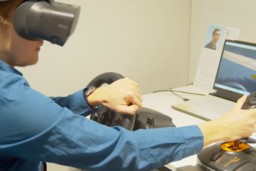 science DigitalisationKees Study: Can Kees drive an asphalt roller?What happens when you let someone with no experience drive a rolling machine? In this episode of Kees Study, Kees explores how people learn new skills with technology.
science DigitalisationKees Study: Can Kees drive an asphalt roller?What happens when you let someone with no experience drive a rolling machine? In this episode of Kees Study, Kees explores how people learn new skills with technology.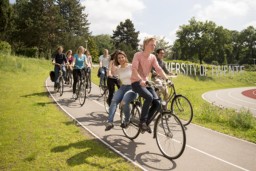 science TechnologyA smart bike: would you give it a go?Cars with smart features? We’re no longer surprised by them. Fully self-driving vehicles may still be on the horizon, but a car that reads road signs, brakes automatically, and keeps a safe distance? You’ll find one at any decent dealership these days. But could something like that… work on a bike?
science TechnologyA smart bike: would you give it a go?Cars with smart features? We’re no longer surprised by them. Fully self-driving vehicles may still be on the horizon, but a car that reads road signs, brakes automatically, and keeps a safe distance? You’ll find one at any decent dealership these days. But could something like that… work on a bike? science HealthHow digital technology can support vulnerable groupsYou are young, struggling with your identity, and feel misunderstood by those around you. When you finally take the step to seek help, you find yourself on a two-year waiting list. In the meantime? Little to no support. For many LGBTQ young people, this is not a fictional scenario, but the harsh reality. The healthcare system is stuck: GPs are at a loss and psychological care is overloaded. But what if digital technology can play a role in this?
science HealthHow digital technology can support vulnerable groupsYou are young, struggling with your identity, and feel misunderstood by those around you. When you finally take the step to seek help, you find yourself on a two-year waiting list. In the meantime? Little to no support. For many LGBTQ young people, this is not a fictional scenario, but the harsh reality. The healthcare system is stuck: GPs are at a loss and psychological care is overloaded. But what if digital technology can play a role in this?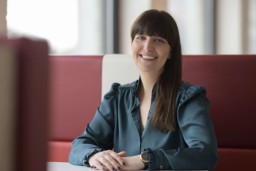 science HealthThis tool sees what you (don’t) feel: prolonged griefWe all face loss at some point in our lives. For some people, the grief becomes increasingly bearable, but others struggle with their grief for years. That is why researcher Lonneke Lenferink is working on the mourning meter, a scientifically validated questionnaire that measures the severity of grief and thus keeps an eye on it.
science HealthThis tool sees what you (don’t) feel: prolonged griefWe all face loss at some point in our lives. For some people, the grief becomes increasingly bearable, but others struggle with their grief for years. That is why researcher Lonneke Lenferink is working on the mourning meter, a scientifically validated questionnaire that measures the severity of grief and thus keeps an eye on it. science TechnologyBuild your own flightradar – Track aircraft live from your backyard!Watching planes move across the world map in real time is fascinating – websites like Flightradar24 make it possible. You can daydream about far-off destinations, check which aircraft are flying over your house, or keep track of whether your friends have landed safely. But how does it actually work? How does a flight radar know exactly where all these planes are?
science TechnologyBuild your own flightradar – Track aircraft live from your backyard!Watching planes move across the world map in real time is fascinating – websites like Flightradar24 make it possible. You can daydream about far-off destinations, check which aircraft are flying over your house, or keep track of whether your friends have landed safely. But how does it actually work? How does a flight radar know exactly where all these planes are? science DigitalisationHow Big Tech is weaponising public opinionPropaganda used to be distributed through leaflets or broadcast over the radio. Today, it reaches us with a click on our smartphones, and it is tailored to our preferences. The way we consume information has changed - and with it, the way we form our beliefs about political and social institutions. Assistant professor Adam Heschke is worried about what comes next.
science DigitalisationHow Big Tech is weaponising public opinionPropaganda used to be distributed through leaflets or broadcast over the radio. Today, it reaches us with a click on our smartphones, and it is tailored to our preferences. The way we consume information has changed - and with it, the way we form our beliefs about political and social institutions. Assistant professor Adam Heschke is worried about what comes next.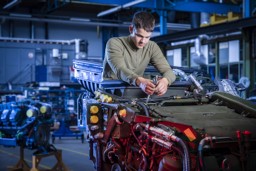 science TechnologyWhen failure isn’t an option: smart maintenance for defenceEarlier this year, Prof. Tiedo Tinga was invited to speak at the Dutch Parliament (Tweede Kamer) about strengthening the connection between academia and the Ministry of Defence. The topic of discussion was how scientific research could address some of the Ministry’s challenges.
science TechnologyWhen failure isn’t an option: smart maintenance for defenceEarlier this year, Prof. Tiedo Tinga was invited to speak at the Dutch Parliament (Tweede Kamer) about strengthening the connection between academia and the Ministry of Defence. The topic of discussion was how scientific research could address some of the Ministry’s challenges.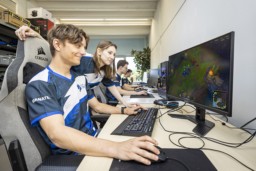 science TechnologyFive reasons why playing games is actually good for youThere is no way around it: gaming is the largest entertainment industry in the world. Ask any concerned parent what they think of digital games, though, and the answers paint a picture of addictive, isolating, and violent time-wasters. How could such horrible things draw in billions of players?
science TechnologyFive reasons why playing games is actually good for youThere is no way around it: gaming is the largest entertainment industry in the world. Ask any concerned parent what they think of digital games, though, and the answers paint a picture of addictive, isolating, and violent time-wasters. How could such horrible things draw in billions of players?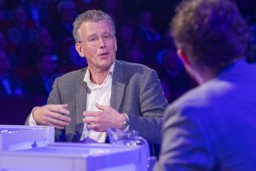 science TechnologyNo Wi-Fi without Twente: How alumnus Cees Links invented wireless internetWi-Fi is everywhere. From your phone to your laptop, from trains to restaurants—but did you know this world-changing technology has its roots in Twente? Cees Links, an alumnus of the University of Twente, played a key role in the invention of wireless internet. Yet, his idea was not initially taken seriously. It took years of perseverance, an unexpected phone call from Steve Jobs, and a pitch at Apple before Wi-Fi became a global success. How did he do it? This is the story of the inventor of Wi-Fi and how his breakthrough forever changed the world forever.
science TechnologyNo Wi-Fi without Twente: How alumnus Cees Links invented wireless internetWi-Fi is everywhere. From your phone to your laptop, from trains to restaurants—but did you know this world-changing technology has its roots in Twente? Cees Links, an alumnus of the University of Twente, played a key role in the invention of wireless internet. Yet, his idea was not initially taken seriously. It took years of perseverance, an unexpected phone call from Steve Jobs, and a pitch at Apple before Wi-Fi became a global success. How did he do it? This is the story of the inventor of Wi-Fi and how his breakthrough forever changed the world forever.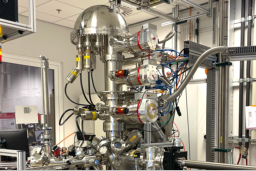 science ClimateThe battery in your smartphone could last much longer than it does nowBatteries are everywhere. In your pocket, in your car and in lots of other places. Yet, despite their ubiquity, batteries are far from reaching their full potential. They degrade over time, charge slowly and are often made of unethically sourced or environmentally harmful materials. Prof. Mark Huijben and his Research Group are looking into novel battery materials to extend battery life and improve performance across applications, from smartphones to heavy machinery.
science ClimateThe battery in your smartphone could last much longer than it does nowBatteries are everywhere. In your pocket, in your car and in lots of other places. Yet, despite their ubiquity, batteries are far from reaching their full potential. They degrade over time, charge slowly and are often made of unethically sourced or environmentally harmful materials. Prof. Mark Huijben and his Research Group are looking into novel battery materials to extend battery life and improve performance across applications, from smartphones to heavy machinery. science ClimateWhat satellites don’t tell us (yet): The Veluwe as a living laboratoryIn the heart of the Netherlands, among the centuries-old trees of the Veluwe, a new way of studying our planet is taking shape. Using advanced sensors, Paul Vermunt is comparing mathematical models with satellite data. His ultimate goal is to enable satellites from among other ESA to measure the water content in forests.
science ClimateWhat satellites don’t tell us (yet): The Veluwe as a living laboratoryIn the heart of the Netherlands, among the centuries-old trees of the Veluwe, a new way of studying our planet is taking shape. Using advanced sensors, Paul Vermunt is comparing mathematical models with satellite data. His ultimate goal is to enable satellites from among other ESA to measure the water content in forests.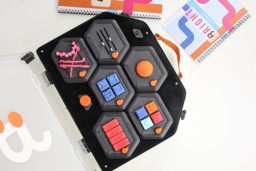 student BachelorInclusive gaming: Industrial Design Engineering students make it happenTraditionally, games for the visually impaired include mostly playing cards with braille – fun, but not nearly as immersive and engaging as a game can be. That’s what Industrial Design Engineering students Jonathan, Kara, Leire, Martina, Marcello and Nuria thought when they first started developing BRIGHT, an inclusive collaboration and communication game. Now, about one and a half years later, they have presented their game at Dutch Design Week 2024.
student BachelorInclusive gaming: Industrial Design Engineering students make it happenTraditionally, games for the visually impaired include mostly playing cards with braille – fun, but not nearly as immersive and engaging as a game can be. That’s what Industrial Design Engineering students Jonathan, Kara, Leire, Martina, Marcello and Nuria thought when they first started developing BRIGHT, an inclusive collaboration and communication game. Now, about one and a half years later, they have presented their game at Dutch Design Week 2024.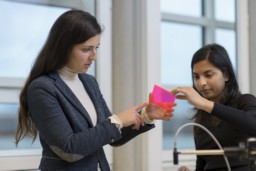 science ClimateWhy do solar panels struggle in winter?Did you know that in winter, solar panels produce only 10% of their summer output? In a country like the Netherlands, where we lead the world with 3.5 solar panels per person, this seasonal drop is a major challenge. Why do solar panels produce so little energy in winter? And what can we do about it?
science ClimateWhy do solar panels struggle in winter?Did you know that in winter, solar panels produce only 10% of their summer output? In a country like the Netherlands, where we lead the world with 3.5 solar panels per person, this seasonal drop is a major challenge. Why do solar panels produce so little energy in winter? And what can we do about it?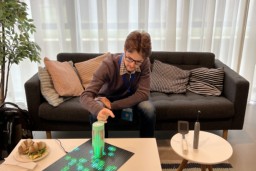 science HealthTurning everyday objects into tools for recoveryWhen people recover from a stroke, they often start by doing exercises in a clinic. But once they go home, they need to keep exercising to keep their hands and wrists functional. These exercises can feel boring and hard to stick to. Many people skip the recommended 30 minutes of daily exercises, which slows down or reverses their recovery. But what if brushing your teeth or drinking your morning coffee could help you get better?
science HealthTurning everyday objects into tools for recoveryWhen people recover from a stroke, they often start by doing exercises in a clinic. But once they go home, they need to keep exercising to keep their hands and wrists functional. These exercises can feel boring and hard to stick to. Many people skip the recommended 30 minutes of daily exercises, which slows down or reverses their recovery. But what if brushing your teeth or drinking your morning coffee could help you get better?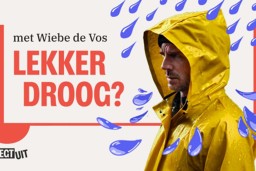 science TechnologyThis is why there are holes in your raincoatHow does your raincoat stop rain while letting your sweat through? This is due to the special properties of the fabric and design. In this video, UT professor Wiebe de Vos explains how this works.
science TechnologyThis is why there are holes in your raincoatHow does your raincoat stop rain while letting your sweat through? This is due to the special properties of the fabric and design. In this video, UT professor Wiebe de Vos explains how this works. science Technology'Wie is de Mol?' through the eyes of a statisticianThere are many ways to predict the mole. Mole spotters often talk about body language, intrigue, granted screen time or social behaviour. Nice, vague and exciting, of course, and good for a heated discussion but could it be more exact? What about mathematics, can it help us here too?
science Technology'Wie is de Mol?' through the eyes of a statisticianThere are many ways to predict the mole. Mole spotters often talk about body language, intrigue, granted screen time or social behaviour. Nice, vague and exciting, of course, and good for a heated discussion but could it be more exact? What about mathematics, can it help us here too?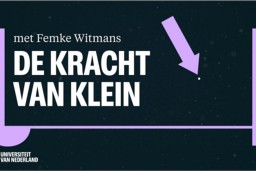 science TechnologyWhat do nanotechnology and tennis balls have in common?More than you might think! Did you know that nanotechnology plays a vital role in everyday products like sunscreen, water-repellent clothing, and even tennis balls? Nanotechnologist Femke Witmans from the University of Twente takes you on a journey into the fascinating world of nanoparticles.
science TechnologyWhat do nanotechnology and tennis balls have in common?More than you might think! Did you know that nanotechnology plays a vital role in everyday products like sunscreen, water-repellent clothing, and even tennis balls? Nanotechnologist Femke Witmans from the University of Twente takes you on a journey into the fascinating world of nanoparticles.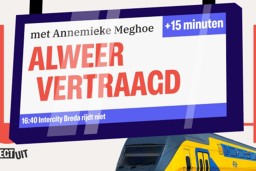 science TechnologyWhy are trains so often delayed in the Netherlands?Have you ever stood on the platform, frustrated because your train was delayed yet again? Spoiler: it’s not just the leaves on the tracks.
science TechnologyWhy are trains so often delayed in the Netherlands?Have you ever stood on the platform, frustrated because your train was delayed yet again? Spoiler: it’s not just the leaves on the tracks.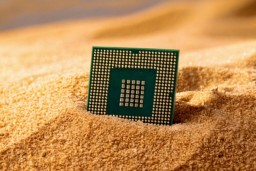 science Chip TechnologyFrom sand to smartphoneThe smartphone in your pocket and other electronic devices are packed with microchips. With a huge demand for smartphones, computers, and other smart technologies, there is a global shortage of these chips. Production processes simply cannot keep pace with the immense demand. But why does making a computer chip take so long?
science Chip TechnologyFrom sand to smartphoneThe smartphone in your pocket and other electronic devices are packed with microchips. With a huge demand for smartphones, computers, and other smart technologies, there is a global shortage of these chips. Production processes simply cannot keep pace with the immense demand. But why does making a computer chip take so long?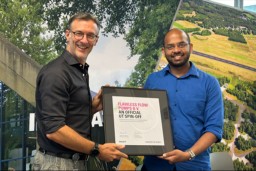 science HealthUT scientist Keerthi makes dream come true with his own spin-off companySome researchers start their PhD to contribute to fundamental research, while others dream of starting their own company based on their research. Keerthivasan Rajamani (Keerthi for short) was one of those entrepreneurial researchers. He founded UT spin-off Flawless Flow Pumps based on his research on magnetic pumps. He shares his journey from researcher to entrepreneur.
science HealthUT scientist Keerthi makes dream come true with his own spin-off companySome researchers start their PhD to contribute to fundamental research, while others dream of starting their own company based on their research. Keerthivasan Rajamani (Keerthi for short) was one of those entrepreneurial researchers. He founded UT spin-off Flawless Flow Pumps based on his research on magnetic pumps. He shares his journey from researcher to entrepreneur. science HealthHow mini hearts-on-chips can save millionsEvery year, cardiovascular disease impacts over 126 million people worldwide. In the quest for effective treatments, researchers are tirelessly working to develop better solutions. However, current animal and test-tube models often fall short in predictive accuracy. Prof. Dr. Robert Passier is at the forefront of this research, combining advanced technologies to create innovative human heart models that function like real human hearts. This groundbreaking invention could lead to safer medications and reduced reliance on animal testing in research.
science HealthHow mini hearts-on-chips can save millionsEvery year, cardiovascular disease impacts over 126 million people worldwide. In the quest for effective treatments, researchers are tirelessly working to develop better solutions. However, current animal and test-tube models often fall short in predictive accuracy. Prof. Dr. Robert Passier is at the forefront of this research, combining advanced technologies to create innovative human heart models that function like real human hearts. This groundbreaking invention could lead to safer medications and reduced reliance on animal testing in research.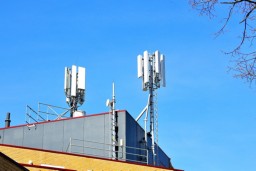 science DigitalisationHow your mobile internet could be much betterImagine: you’re at a festival, and your phone always has full signal. No more slow internet or apps that won’t load. Sounds like a dream, right? Lotte Weedage, a PhD candidate at the University of Twente, is researching ways to improve the mobile network in the Netherlands, so this could become a reality.
science DigitalisationHow your mobile internet could be much betterImagine: you’re at a festival, and your phone always has full signal. No more slow internet or apps that won’t load. Sounds like a dream, right? Lotte Weedage, a PhD candidate at the University of Twente, is researching ways to improve the mobile network in the Netherlands, so this could become a reality.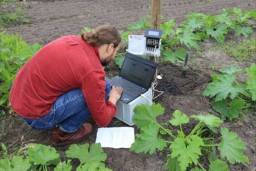 science Circular EconomyIs this the farm of tomorrow?At Citizen Farm Herenboeren Usseler Es, farmers are exploring how data can help them adapt to climate change challenges, such as unpredictable weather and longer growing seasons. Researchers from the University of Twente are helping by providing them with more precise data for better-informed farming decisions. The goal is to enhance local food production while offering valuable insights for farms around the world.
science Circular EconomyIs this the farm of tomorrow?At Citizen Farm Herenboeren Usseler Es, farmers are exploring how data can help them adapt to climate change challenges, such as unpredictable weather and longer growing seasons. Researchers from the University of Twente are helping by providing them with more precise data for better-informed farming decisions. The goal is to enhance local food production while offering valuable insights for farms around the world.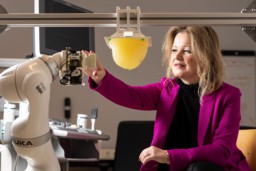 science RoboticsThese robots will help detect and treat cancerAt the laboratories of the University of Twente, researchers are working on robotics that will improve healthcare. These studies aim to make care more personalised and precise, ensuring that every patient receives the treatment that suits them best. While robots are already used in healthcare, in the future they will be deployed even more frequently. In this story, we’ll look at how robotics is helping to detect and treat cancer.
science RoboticsThese robots will help detect and treat cancerAt the laboratories of the University of Twente, researchers are working on robotics that will improve healthcare. These studies aim to make care more personalised and precise, ensuring that every patient receives the treatment that suits them best. While robots are already used in healthcare, in the future they will be deployed even more frequently. In this story, we’ll look at how robotics is helping to detect and treat cancer. science TechnologyWater, water everywhere... and not a drop to drink: How the Netherlands keeps its drinking water safeThe Netherlands faces a water crisis: too much water, a shortage of water, agricultural fertilisers, and industrial pollution such as PFAS and medicine residues threaten our drinking water supply. Some new businesses are already denied drinking water connections; new residential areas may soon meet the same fate. It is crucial to invest in water technology for a sustainable future.
science TechnologyWater, water everywhere... and not a drop to drink: How the Netherlands keeps its drinking water safeThe Netherlands faces a water crisis: too much water, a shortage of water, agricultural fertilisers, and industrial pollution such as PFAS and medicine residues threaten our drinking water supply. Some new businesses are already denied drinking water connections; new residential areas may soon meet the same fate. It is crucial to invest in water technology for a sustainable future.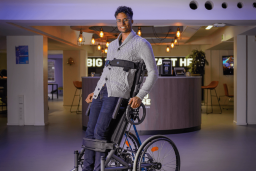 science HealthThis is the wheelchair of the futureWithin innovation cluster MedTech Twente, people are working on tomorrow's healthcare. UT alumnus Gabriel Costa and Stephanie Jansen, founders of spin-off company J58, talk about the importance of patient-centred innovations, the ecosystem in Twente and making an impact.
science HealthThis is the wheelchair of the futureWithin innovation cluster MedTech Twente, people are working on tomorrow's healthcare. UT alumnus Gabriel Costa and Stephanie Jansen, founders of spin-off company J58, talk about the importance of patient-centred innovations, the ecosystem in Twente and making an impact.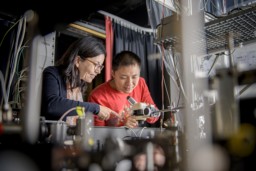 science HealthNovel device for fast detection of sepsisWithin a newly funded project SepsPIC (Highly multiplexed photonics integrated circuit (PIC) sensors for the rapid diagnostics of sepsis), UT Professor Sonia García Blanco and her colleagues are working on a novel device for fast and accurate detection of sepsis. ‘If we are successful, it could dramatically decrease mortality among patients.’
science HealthNovel device for fast detection of sepsisWithin a newly funded project SepsPIC (Highly multiplexed photonics integrated circuit (PIC) sensors for the rapid diagnostics of sepsis), UT Professor Sonia García Blanco and her colleagues are working on a novel device for fast and accurate detection of sepsis. ‘If we are successful, it could dramatically decrease mortality among patients.’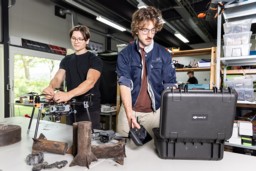 student BachelorCan you detect landmines with a drone? These Mechanical Engineering students researched howYou might not always think about it, but landmines are still an enormous global threat in today's day and age – with (post-)conflict regions being heavily contaminated. The demining of such areas is extremely dangerous and time-consuming. Mechanical Engineering students Benjamin O’regan and Reinis Jaunarajs developed an effective solution as part of their bachelor’s thesis project: they built landmine detection drones.
student BachelorCan you detect landmines with a drone? These Mechanical Engineering students researched howYou might not always think about it, but landmines are still an enormous global threat in today's day and age – with (post-)conflict regions being heavily contaminated. The demining of such areas is extremely dangerous and time-consuming. Mechanical Engineering students Benjamin O’regan and Reinis Jaunarajs developed an effective solution as part of their bachelor’s thesis project: they built landmine detection drones.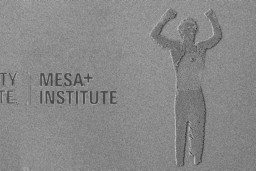 science TechnologyThese athletes are thinner than your hairsThe greatest athletes are awarded medal after medal at the Paris Olympics. At the same time, very small athletes in Twente are imitating them. In MESA+'s Nanolab, a group of enthusiastic PhD students are making Olympians-on-a-chip. They organise the Nanolympics. The best sports fragments are given a place on chips measuring just five by five millimetres.
science TechnologyThese athletes are thinner than your hairsThe greatest athletes are awarded medal after medal at the Paris Olympics. At the same time, very small athletes in Twente are imitating them. In MESA+'s Nanolab, a group of enthusiastic PhD students are making Olympians-on-a-chip. They organise the Nanolympics. The best sports fragments are given a place on chips measuring just five by five millimetres.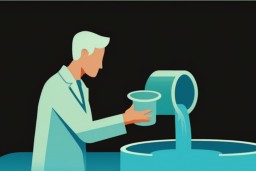 science Circular EconomyOur waste (water) is worth a lotImagine sipping your favourite beer from a cup made of sewage sludge. Researchers at the University of Twente are making it a reality. A team of Profs. Jeroen Cornelissen, Frederik Wurm, and Boelo Schuur are investigating a new process for converting waste materials into bioplastics with the help of bacteria that feed on what people discard daily.
science Circular EconomyOur waste (water) is worth a lotImagine sipping your favourite beer from a cup made of sewage sludge. Researchers at the University of Twente are making it a reality. A team of Profs. Jeroen Cornelissen, Frederik Wurm, and Boelo Schuur are investigating a new process for converting waste materials into bioplastics with the help of bacteria that feed on what people discard daily.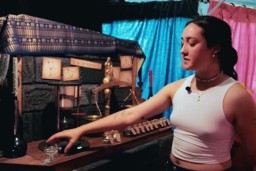 student BachelorDoes screen time impact your lifestyle and health? Creative Technology students show you how!Most people know that spending too much time on your phone can negatively affect your mental health. Yet here we are – often chronically online and spending most of our (free) time on screens, with all its consequences. That’s why student Creative Technology Nina and her project group decided to create an interactive installation for people to reflect on their screen time and happiness. In this article, she talks all about their work and its importance in today’s society.
student BachelorDoes screen time impact your lifestyle and health? Creative Technology students show you how!Most people know that spending too much time on your phone can negatively affect your mental health. Yet here we are – often chronically online and spending most of our (free) time on screens, with all its consequences. That’s why student Creative Technology Nina and her project group decided to create an interactive installation for people to reflect on their screen time and happiness. In this article, she talks all about their work and its importance in today’s society.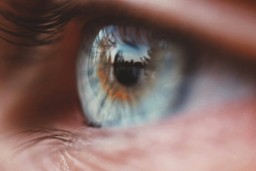 science TechnologyWhy do you not see what I see?In any project using images acquired by satellite sensors or from drones, you will frequently display images to look at. Before even diving into technical issues that have an effect on the display, let’s first focus on what we think we have in common and under control: our own visual system.
science TechnologyWhy do you not see what I see?In any project using images acquired by satellite sensors or from drones, you will frequently display images to look at. Before even diving into technical issues that have an effect on the display, let’s first focus on what we think we have in common and under control: our own visual system.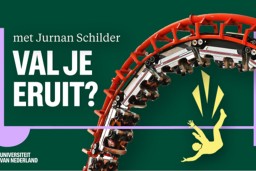 science TechnologyWhy you can ride a rollercoaster without a safety barImagine a roller coaster without a safety bar. Sounds incredible, but Jurnan Schilder, a mechanical engineer at the University of Twente, proves that it is possible. In this video from De Universiteit van Nederland, he demonstrates how physical forces keep you safely in your seat, even during a looping. He explains how these forces act on us every…
science TechnologyWhy you can ride a rollercoaster without a safety barImagine a roller coaster without a safety bar. Sounds incredible, but Jurnan Schilder, a mechanical engineer at the University of Twente, proves that it is possible. In this video from De Universiteit van Nederland, he demonstrates how physical forces keep you safely in your seat, even during a looping. He explains how these forces act on us every…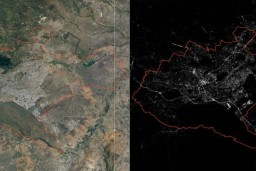 science TechnologyHow satellites expose urban inequalities in the Global SouthMass evictions, daily power outages, and pitch-black streets at night: the challenges that people in the Global South face remain largely overlooked. How can satellite imagery uncover the hidden realities of urbanisation? Prof. Dr. Monika Kuffer’s research strives to spotlight urban inequalities and prompt policymakers to take action.
science TechnologyHow satellites expose urban inequalities in the Global SouthMass evictions, daily power outages, and pitch-black streets at night: the challenges that people in the Global South face remain largely overlooked. How can satellite imagery uncover the hidden realities of urbanisation? Prof. Dr. Monika Kuffer’s research strives to spotlight urban inequalities and prompt policymakers to take action.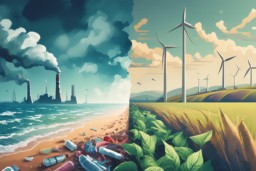 science Circular EconomyThe plastics dilemma: Are biodegradable plastics the answer?We are living in the Plastic Age, such is the ubiquity of plastics in our lives. The plastic waste in water ecosystems alone is expected to nearly triple from 11 million tonnes in 2016 to 29 million tonnes in 2040*. Biodegradable materials, such as polylactic acid, are seen as an alternative for use in packaging, agriculture, and medical devices. But how biodegradable are these materials in reality? Could they be the plastics of the future?
science Circular EconomyThe plastics dilemma: Are biodegradable plastics the answer?We are living in the Plastic Age, such is the ubiquity of plastics in our lives. The plastic waste in water ecosystems alone is expected to nearly triple from 11 million tonnes in 2016 to 29 million tonnes in 2040*. Biodegradable materials, such as polylactic acid, are seen as an alternative for use in packaging, agriculture, and medical devices. But how biodegradable are these materials in reality? Could they be the plastics of the future?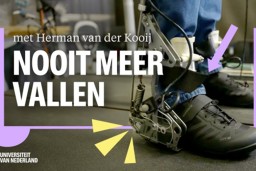 science HealthThis device will keep you from fallingGetting smarter, stronger and faster with technology. That is what UT professor Herman van der Kooij and his team are researching every day. At 'Universiteit van Nederland', he talks about the bionic man.
science HealthThis device will keep you from fallingGetting smarter, stronger and faster with technology. That is what UT professor Herman van der Kooij and his team are researching every day. At 'Universiteit van Nederland', he talks about the bionic man.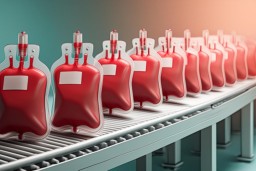 science HealthThe blood substitute that could save livesDoctors need blood to treat certain cancers, anaemia, and other blood-related illnesses, but also need it in emergency or scheduled surgeries. Most people are unaware, but blood shortages are quite frequent and can happen anytime. Blood donors are always needed. Francisca Fernandes Gomes, PhD student at the University of Twente, aims to create synthetic, artificial blood that can replace the need for donated blood. In this story she explains her work.
science HealthThe blood substitute that could save livesDoctors need blood to treat certain cancers, anaemia, and other blood-related illnesses, but also need it in emergency or scheduled surgeries. Most people are unaware, but blood shortages are quite frequent and can happen anytime. Blood donors are always needed. Francisca Fernandes Gomes, PhD student at the University of Twente, aims to create synthetic, artificial blood that can replace the need for donated blood. In this story she explains her work.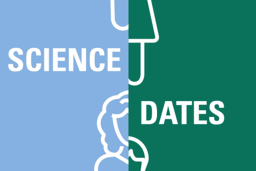 science RoboticsScience Date - Science communication and robotsImagine a date between two researchers from completely different research fields, what would happen? In this video, researchers Anne Dijkstra and Douwe Dresscher meet, each with their own unique field of research. Is it a match?
science RoboticsScience Date - Science communication and robotsImagine a date between two researchers from completely different research fields, what would happen? In this video, researchers Anne Dijkstra and Douwe Dresscher meet, each with their own unique field of research. Is it a match? science ClimateThis glass laboratory could be the key to unlimited clean drinking waterA looming shortage of clean drinking water is screaming for innovations in water treatment. The Waterlab of the Membrane Science and Technology cluster gives an insight into possible solutions.
science ClimateThis glass laboratory could be the key to unlimited clean drinking waterA looming shortage of clean drinking water is screaming for innovations in water treatment. The Waterlab of the Membrane Science and Technology cluster gives an insight into possible solutions.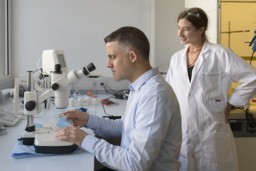 science HealthNeedle-free insulin injections are on the wayLee Calladine has been diabetic for 25 years and the insulin top-up routine is so familiar to him that he’s long past feeling squeamish about piercing his skin. Still, the practice is burdensome. Scientists at the TechMed Centre of the University of Twente are closing in on a pain-free method for people like Calladine.
science HealthNeedle-free insulin injections are on the wayLee Calladine has been diabetic for 25 years and the insulin top-up routine is so familiar to him that he’s long past feeling squeamish about piercing his skin. Still, the practice is burdensome. Scientists at the TechMed Centre of the University of Twente are closing in on a pain-free method for people like Calladine.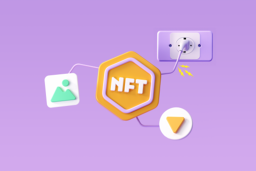 science DigitalisationThe pollution of our digital worldBitcoin, non-fungible tokens (NFTs), and other popular blockchain innovations represent our shift to a digital society. But this transition comes at a cost. The emissions generated by these blockchain technologies from the year 2021 alone are responsible for around 19,000 future deaths. This alarming statistic raises many questions: How is this possible and what can we do about it?
science DigitalisationThe pollution of our digital worldBitcoin, non-fungible tokens (NFTs), and other popular blockchain innovations represent our shift to a digital society. But this transition comes at a cost. The emissions generated by these blockchain technologies from the year 2021 alone are responsible for around 19,000 future deaths. This alarming statistic raises many questions: How is this possible and what can we do about it?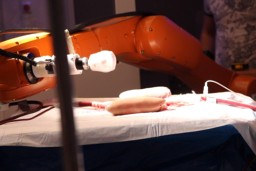 science HealthMini robot doctors inside your bodyA surgeon swimming through your body, it sounds like science fiction now, but it might be closer than you think. At the TechMed Centre at the University of Twente, tiny robots were already swimming through a detached aorta with kidneys. Discover the future of vascular surgery.
science HealthMini robot doctors inside your bodyA surgeon swimming through your body, it sounds like science fiction now, but it might be closer than you think. At the TechMed Centre at the University of Twente, tiny robots were already swimming through a detached aorta with kidneys. Discover the future of vascular surgery.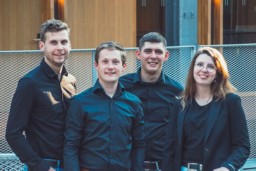 science TechnologyAn electric off-road motorcycle that can compete with internal combustion enginesUniversity of Twente startup STERN Motorcycles, unveils a revolutionary electric enduro motorcycle with a distinctive interchangeable battery pack. Their mission? A motorcycle world that embraces electric riding.
science TechnologyAn electric off-road motorcycle that can compete with internal combustion enginesUniversity of Twente startup STERN Motorcycles, unveils a revolutionary electric enduro motorcycle with a distinctive interchangeable battery pack. Their mission? A motorcycle world that embraces electric riding.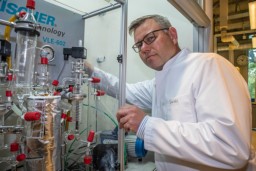 science Circular EconomyBreaking down waste and building it up like legoFor years, we've diligently sorted our waste, but a significant portion of the waste stream remains (yet) unrecyclable. The University of Twente, in collaboration with companies, is researching how to create new products from complex and 'wet' waste streams. This involves efficiently isolating chemical components used in new materials. The multi-year project ReBBloCS - Renewable Building Blocks from Complex and Wet Waste - began last year with a subsidy of €3.8 million from the Netherlands Enterprise Agency.
science Circular EconomyBreaking down waste and building it up like legoFor years, we've diligently sorted our waste, but a significant portion of the waste stream remains (yet) unrecyclable. The University of Twente, in collaboration with companies, is researching how to create new products from complex and 'wet' waste streams. This involves efficiently isolating chemical components used in new materials. The multi-year project ReBBloCS - Renewable Building Blocks from Complex and Wet Waste - began last year with a subsidy of €3.8 million from the Netherlands Enterprise Agency.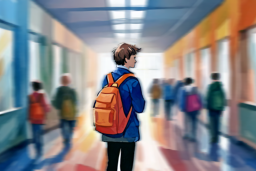 science TechnologySmartwatches measuring loneliness among young peopleSmartwatches that map loneliness among students with specific needs, such as autism. Thanks to UT professor Carolien Rieffe and her team, this will soon be a reality. Carolien received a substantial sum of money from science financier NWO for the Building 4 Belonging project.
science TechnologySmartwatches measuring loneliness among young peopleSmartwatches that map loneliness among students with specific needs, such as autism. Thanks to UT professor Carolien Rieffe and her team, this will soon be a reality. Carolien received a substantial sum of money from science financier NWO for the Building 4 Belonging project.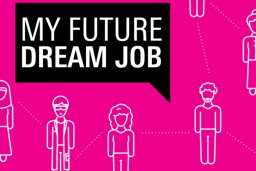 science TechnologyPodcast #3: The competence brokerExplore the future in our podcast series, "My Future Dream Job," where Anic van Damme guides you to the year 2030. Our scientists explore prospective careers in cybersecurity, climate adaptation, and energy transition. Listen in to gain insights into the professions taking shape at the University of Twente.
science TechnologyPodcast #3: The competence brokerExplore the future in our podcast series, "My Future Dream Job," where Anic van Damme guides you to the year 2030. Our scientists explore prospective careers in cybersecurity, climate adaptation, and energy transition. Listen in to gain insights into the professions taking shape at the University of Twente.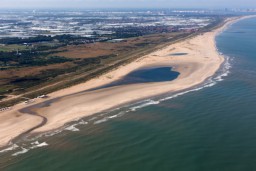 science ClimateGod created the earth, but the Dutch created the NetherlandsThe Netherlands has been fighting a battle against water for centuries. This symbolism of water as the enemy was popular among 20th-century engineers. In the 21st century, there is more focus on natural processes, and we speak of water management instead. But what will the Dutch water landscape look like in another century?
science ClimateGod created the earth, but the Dutch created the NetherlandsThe Netherlands has been fighting a battle against water for centuries. This symbolism of water as the enemy was popular among 20th-century engineers. In the 21st century, there is more focus on natural processes, and we speak of water management instead. But what will the Dutch water landscape look like in another century? science TechnologyUnravelling nano mysteries: Metal nanodroplets go skiingBrace yourself for a mind-boggling journey into the tiny world of nanotechnology. This research area focuses on materials existing of just a few atoms or small molecules. Sometimes, the smallest structures hold the key to groundbreaking advancements. On this scale, the world doesn't follow the same rules.
science TechnologyUnravelling nano mysteries: Metal nanodroplets go skiingBrace yourself for a mind-boggling journey into the tiny world of nanotechnology. This research area focuses on materials existing of just a few atoms or small molecules. Sometimes, the smallest structures hold the key to groundbreaking advancements. On this scale, the world doesn't follow the same rules.